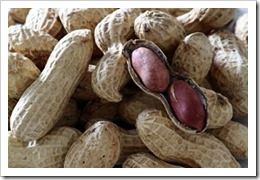 In this study, children of women who participated in the Nurses Health Study II (NHSII) and the Growing Up Today Study 2 (GUTS2) and were born between January 1990 and Dec 31, 1994 were identified. A questionnaire was sent out in 2009 to the mother of every child in these two studies in order to identify children with food allergies. The children themselves had already been surveyed in 2006, on whether or not they had a food allergy. The researchers evaluated the results of these two questionnaires and identified cases of allergies to either peanuts or tree nuts. These cases were then divided into seven levels ranging from likely food allergy to possible food allergy based on the review of the medical information. The mothers had also previously reported on their diet in 1991 and 1995 on the NHSII questionnaires. The questionnaire closest to the birthday of each child was selected to determine the maternal peanut intake.
In this study, children of women who participated in the Nurses Health Study II (NHSII) and the Growing Up Today Study 2 (GUTS2) and were born between January 1990 and Dec 31, 1994 were identified. A questionnaire was sent out in 2009 to the mother of every child in these two studies in order to identify children with food allergies. The children themselves had already been surveyed in 2006, on whether or not they had a food allergy. The researchers evaluated the results of these two questionnaires and identified cases of allergies to either peanuts or tree nuts. These cases were then divided into seven levels ranging from likely food allergy to possible food allergy based on the review of the medical information. The mothers had also previously reported on their diet in 1991 and 1995 on the NHSII questionnaires. The questionnaire closest to the birthday of each child was selected to determine the maternal peanut intake.
A total of 8205 children with 140 cases of peanut/tree nut allergy were identified. Over 95% of the NHSII and GUTS2 participants were Caucasian and 2% of the mothers reported a nut allergy. Women with the highest consumption of peanuts/tree nuts in their peripregnancy (typically 5 months before, during pregnancy and 1 month after pregnancy) diet were more likely to introduce these items into their child’s diet at < 2 years old. The odds of having a child with peanut/tree nut allergy among the mothers without these allergies and who consumed these food 5 or more times/week had the lowest incidence.
Commentary:
The U.S. has seen an increase in the incidence of peanut allergy from 0.4% in 1997 to 1.4% in 2010. It’s become significant enough that some preschools and school settings ban peanuts in snacks and lunches. Frequently occurring together, 80-90% of peanut and tree nut allergies that have an onset in childhood then persist into the adult years. Media and schools and magazines and practitioners have been telling women for many years to avoid giving their children peanuts in the first 3 years of life. Some have even recommended to women that they avoid peanuts during pregnancy and lactation. However, these guidelines changed due to lack of evidence in that several studies demonstrated that peanut consumption during pregnancy and lactation had no effect on subsequent peanut/tree nut allergies in offspring. The current study is attempting to clarify further, any association with peripregnancy consumption of peanuts/tree nuts by mothers and the development or not, of these allergies in their children. This is the first study to my knowledge, actually showing that ingestion during pregnancy may actually be protective for their children, at least that is the case in women who do have any known peanut/tree nut allergy themselves. While this study is not a pure prospective study where diet records are controlled more diligently during pregnancy, and this study did not included information on exclusive breastfeeding rates or duration, I still find it useful, and logical actually. Pediatric guidelines currently states that there is not enough evidence that maternal dietary restrictions during pregnancy will play any role in the prevention of atopic allergic disease in infants. And, although there is not enough evidence to say that consumption of dietary food allergens in pregnancy can reduce the chance of infants developing allergies to those allergens, the current study supports that possibility, and at least gives license for pregnant women who do not themselves have these allergens, to feel free to enjoy the health benefits and yummy goodness of peanuts, peanut butter, and other nuts/nut butters. I would add though, steer clear of sugar containing, hydrogenated fat containing, and even the “creamy” versions, due to palm oil and the usual practice of destructive deforestation, illegal forest fires and the devastating impact on animal species and the destruction of their habitat and endangerment to their survival. You might be interested in reading about some of the multinational corporation practices in this regard, and the Greenpeace investigations and efforts to halt these practices. Oh, and while we are at it, try to choose organic.
Reference: Frazier A, et al. Prospective study of peripregnancy consumption of peanuts or tree nuts by mothers and the risk of peanut or tree nut allergy in their offspring. JAMA Pediatrics Dec 23, 2013 (Epub ahead of print).

